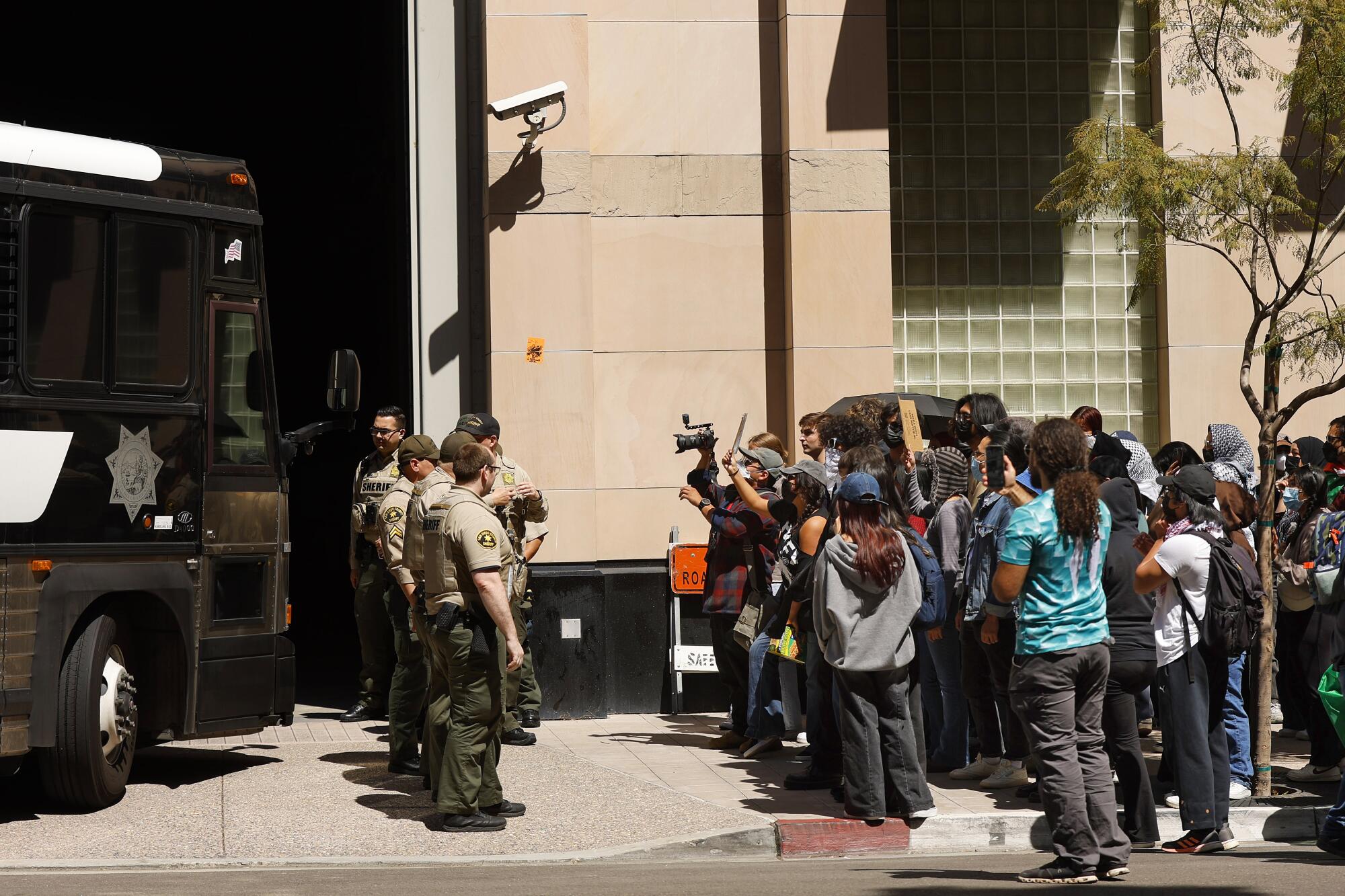
About 200 officers descended on a protest encampment for Gaza just before 6 a.m. Monday near Geisel Library. Hours later, hundreds of protesters gathered outside the downtown San Diego jail demanding release of those who had been arrested.
In an abrupt escalation of tensions, police in riot gear swooped in and cleared an encampment of pro-Palestinian protesters at UC San Diego and arrested 65 people in an early-morning raid Monday, prompting skirmishes with hundreds of protest supporters.
It marked the first large, violent confrontation between police and protesters on the UCSD campus in decades, and led the university to move classes online and close vehicular access to the school grounds west of Interstate 5.
It also followed five days of peaceful protest on a campus that had so far avoided the kinds of clashes that have roiled other universities nationwide amid demonstrations against Israel’s war in Gaza.
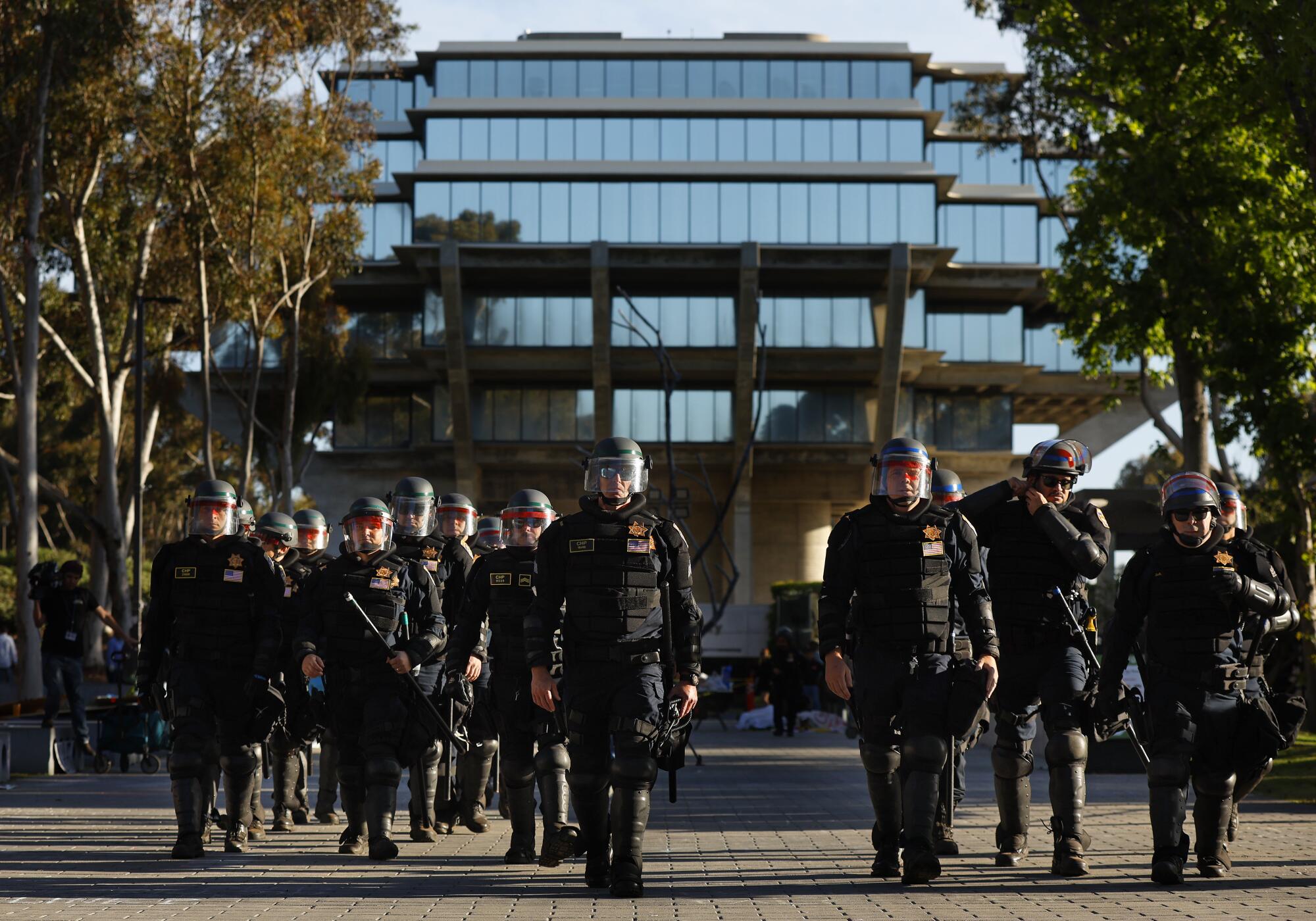
Throughout Monday morning, hundreds of police clashed with protesters near the university’s iconic Geisel Library, after authorities quickly dismantled a tent village and arrested dozens. Afterward, a few hundred protesters headed downtown to rally outside the county jail, chanting “Let them go” and demanding their release.
The crackdown drew swift condemnation from some faculty members.
“I am a faculty member, but today they are my teacher,” said Gary Fields, a UCSD professor who teaches a class on dissent and protest, as he pointed to students outside the jail Monday afternoon. He said school administrators had “turned the police on a completely peaceful and legal demonstration.”
Many students were left frustrated by the university’s actions, including the move to close campus for the day.
“Obviously, it’s unfortunate to see riot teams on campus,” said Ivan Ramirez, a member of Associated Students council who characterized the encampment as “divisive” among students. “Not something that happens everyday. But everything gets to a point where action has to be taken — not this level of action, but I think (administrators) were looking at what was happening on other campuses.”
In a statement late Monday afternoon, Chancellor Pradeep Khosla said the university encourages peaceful protests, “but this encampment violated campus policy and the law and grew to pose an unacceptable risk to the safety of the campus community.” He said demonstrators were given repeated warnings to disperse before arrests were made.
The tension began shortly before 6 a.m. Monday, when police massed near the roughly 50-tent encampment just off Library Walk and told protesters within it that they had 10 minutes to disperse or face arrest. Authorities began arresting demonstrators who had stayed soon after, while others nearby chanted “free, free Palestine.”
It was not immediately clear if efforts had been made by either side to negotiate an end to the encampment before the police action. Protesters’ supporters said the university had not made any such attempt before moving in. The school said it made multiple requests for the protesters to disperse in recent days, but it did not address whether it tried to negotiate beforehand.
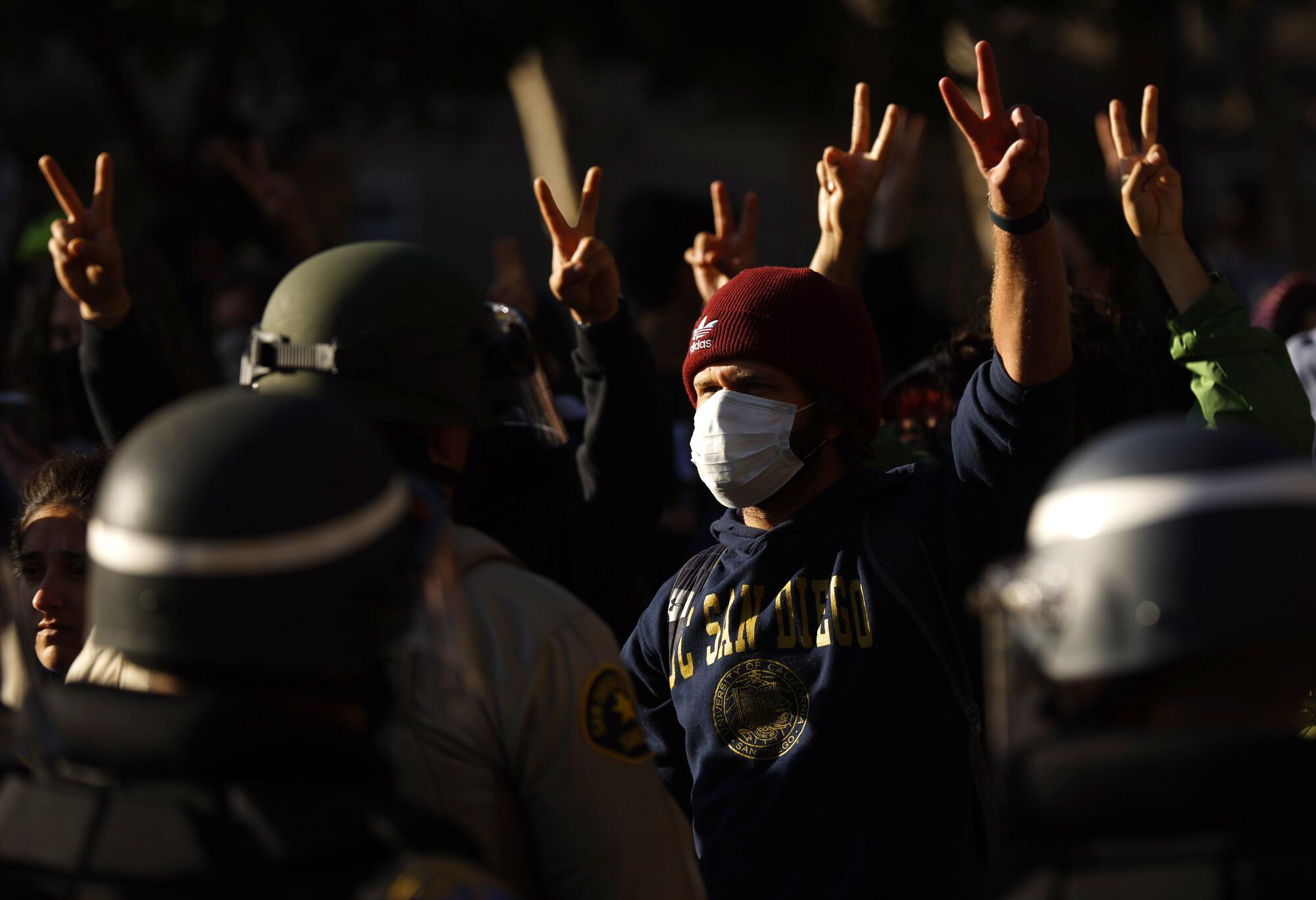
Subrein Damanhoury, an organizer with the Palestinian Youth Movement and spokesperson for the UCSDivest coalition that had organized the encampment, said students were asleep in tents when dozens of officers in riot gear arrived around 5:30 a.m.
“From my knowledge, the encampment was peaceful,” she said. “They were sleeping. There was nothing going on. From what we know, the administration has not come out to talk to the students about their demands, so this was unexpected.”
Officers began making arrests, leading students away one at a time, with their hands zip-tied behind their backs.
Khosla cited “significant dangers” at the site, saying police had found stakes, propane tanks, metal and plywood shields, aerosol spray cans and a sword, and that protesters at the camp had refused access to fire and health inspectors, set up checkpoints and limited free movement.
It took about an hour to tear it down and cart everything off.
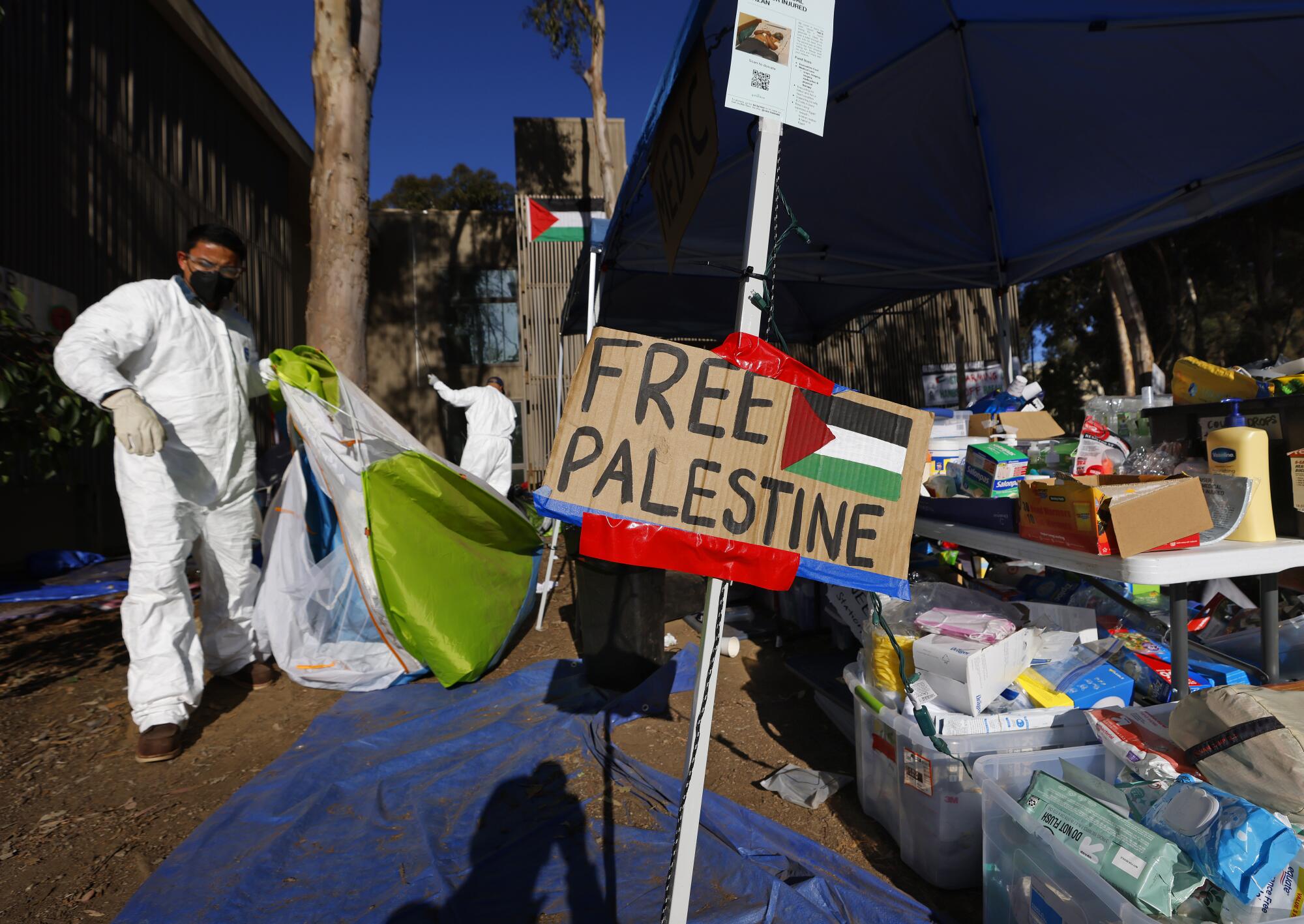
After police cleared the camp, a growing crowd assembled along Library Walk nearby. The first flare-up in their standoff occurred in mid-morning as dozens of protesters got into shoving matches with police trying to transport people who had been arrested off campus in two buses and tried to block the buses from leaving.
That led to a larger clash with the police force, which was made up of campus police, California Highway Patrol officers and San Diego County Sheriff’s Department deputies. Smaller skirmishes then played out around the Price Center, where arrested protesters were initially being held nearby.
The university said two people sustained minor injuries. Protesters and their supporters said police had beaten demonstrators with batons and used pepper spray against them.
The school said at least 40 of the people who were arrested were students and face interim suspension, while another 24 were either unidentified or not directly affiliated with the university.
Nearly all of those taken into custody were arrested on suspicion of unlawful assembly — a misdemeanor — and were to be booked and immediately released. One person was arrested for hindering law enforcement officers, according to the university. Protest organizers would not allow reporters to talk to the people who had been arrested, saying they were trying to protect them from harassment.
By about noon the campus had quieted down, and protesters had begun gathering downtown outside the central jail. After hearing from several speakers, the crowd — which had grown to about 300 people — began marching, making its way to Civic Center Plaza.
“One, two, three, four. Open up the jail door,” they chanted.
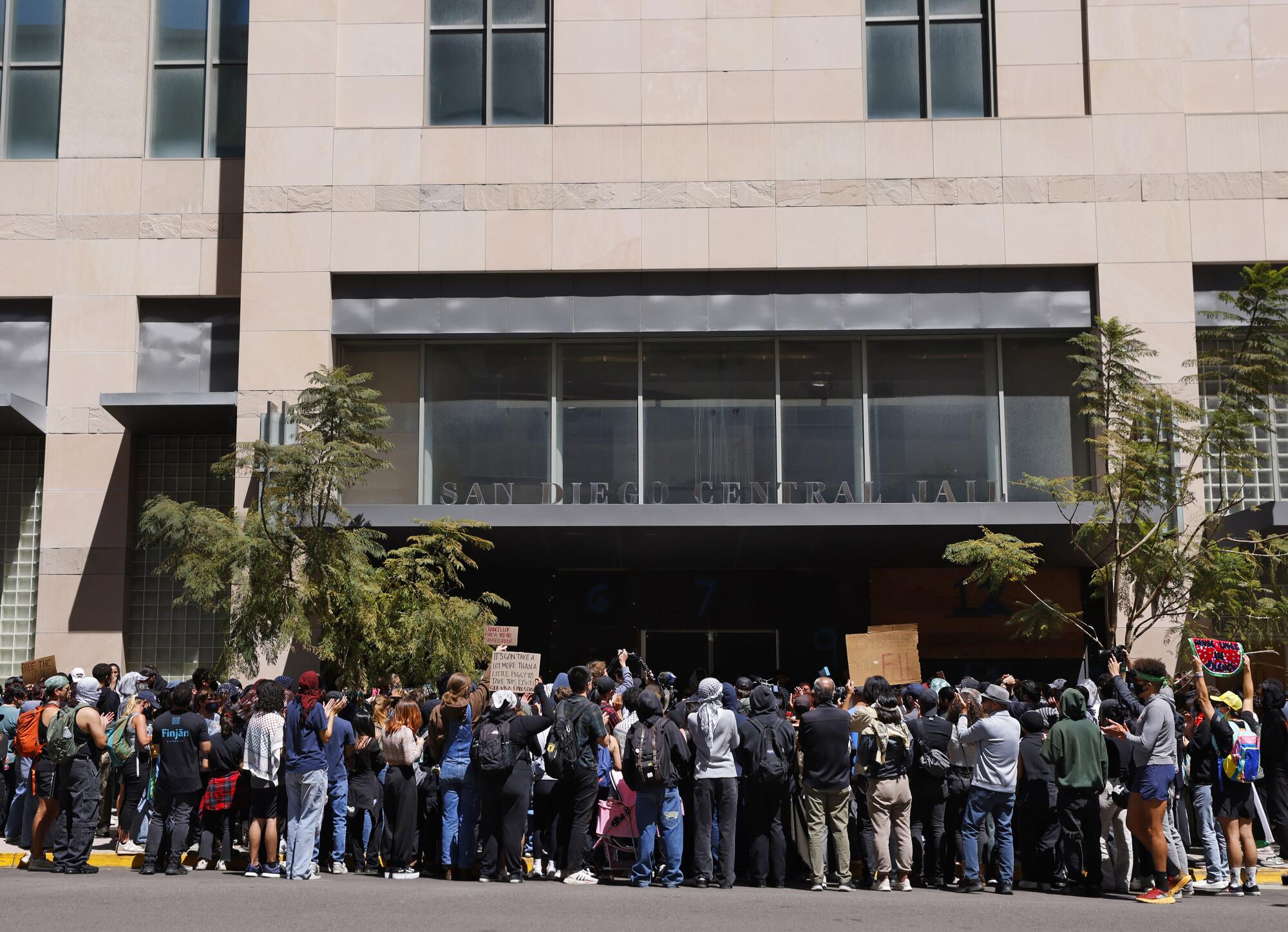
Monday’s campus raid involved about 200 officers, and it came on the morning the campus chapter of Students for Justice in Palestine was scheduled to begin its annual Justice in Palestine Week event.
The confrontation came one day after the days-old demonstration — part of a movement on campuses nationwide — drew a sharp rebuke from Khosla. He broke his silence Sunday with a public statement calling the encampment “illegal” and saying it posed an “unacceptable safety and security hazard.”
“As time passes, the threat and potential for violent clashes increases,” the chancellor said.
David FitzGerald, a sociology professor at UCSD , questioned the university’s handling of the protesters and called the statement Khosla had issued Sunday “a cynical lie” used to justify “a violent oppression of peaceful speech by heavily armed police.”
FitzGerald, who has taught at UCSD since 2007, said the university encourages students to be changemakers.
“Clearly what is happening in Gaza right now with U.S. support is one of the world’s most pressing issues,” he said. “Our students are drawing attention to this, but we are responding by sending in the police to attack them and drag some of them off to jail, when they are really doing what we’ve asked them to do as educators.”
By midday, a several dozen faculty members had signed an open letter to the chancellor and the University of California Board of Regents “imploring” them not to pursue criminal charges or suspend the students or put any marks on their academic record.
“We are asking for them to be lenient,” said Adam Aron, a psychology professor at UCSD. “We don’t want a mark on their records or suspension or criminal charges for standing up with strong and brave voices.”
About 40 faculty, staff and students in the Department of Ethnic Studies had a department call Monday to discuss holding a no-confidence vote on Khosla, according to Jessica Williams, graduate coordinator in the department.
The police raid and subsequent standoff with protesters followed five days of peaceful protesting and counterprotesting on the UCSD campus. On Sunday, the encampment had drawn upward of 200 counterprotesters during a tense but peaceful showdown.
The peaceful protest over the prior five days stood in marked contrast to what had happened on some other campuses, such as UCLA, where pro-Israel counterprotesters last week attacked a Gaza protest encampment for hours, one night before police ultimately dismantled the camp.
The wave of nationwide protests has aimed to pressure American universities to divest from Israel and from companies that activists consider hostile to the Palestinian cause, and to focus attention on the humanitarian crisis unfolding in Gaza as a result of Israel’s war with Hamas.
The UCSDivest coalition that organized the encampment at UCSD has been calling on the university to end institutional partnerships with weapons manufacturers, including General Atomics and Lockheed Martin. It also highlighted research funding provided to the UC system and the university from the Israeli Ministry of Defense.
Nationwide, the demonstrations have been followed on many campuses by police crackdowns. Elsewhere, however, protesters and university administrations have negotiated deals to end the encampments. At UC Berkeley, the student newspaper the Daily Californian reported Sunday that the administration had offered protesters such a proposal.
At UCSD, ahead of the police activity, the university closed its west campus, from North Torrey Pines Road to I-5, and told people to avoid the area. All classes were moved to remote.
Public transportation in the area was disrupted, too. The San Diego Metropolitan Transit System closed the central campus trolley station temporarily, and the transit hub on Gilman Drive in the middle of campus was closed, with buses detouring around it.
Staff writers Kristen Taketa and Lisa Deaderick contributed to this report.
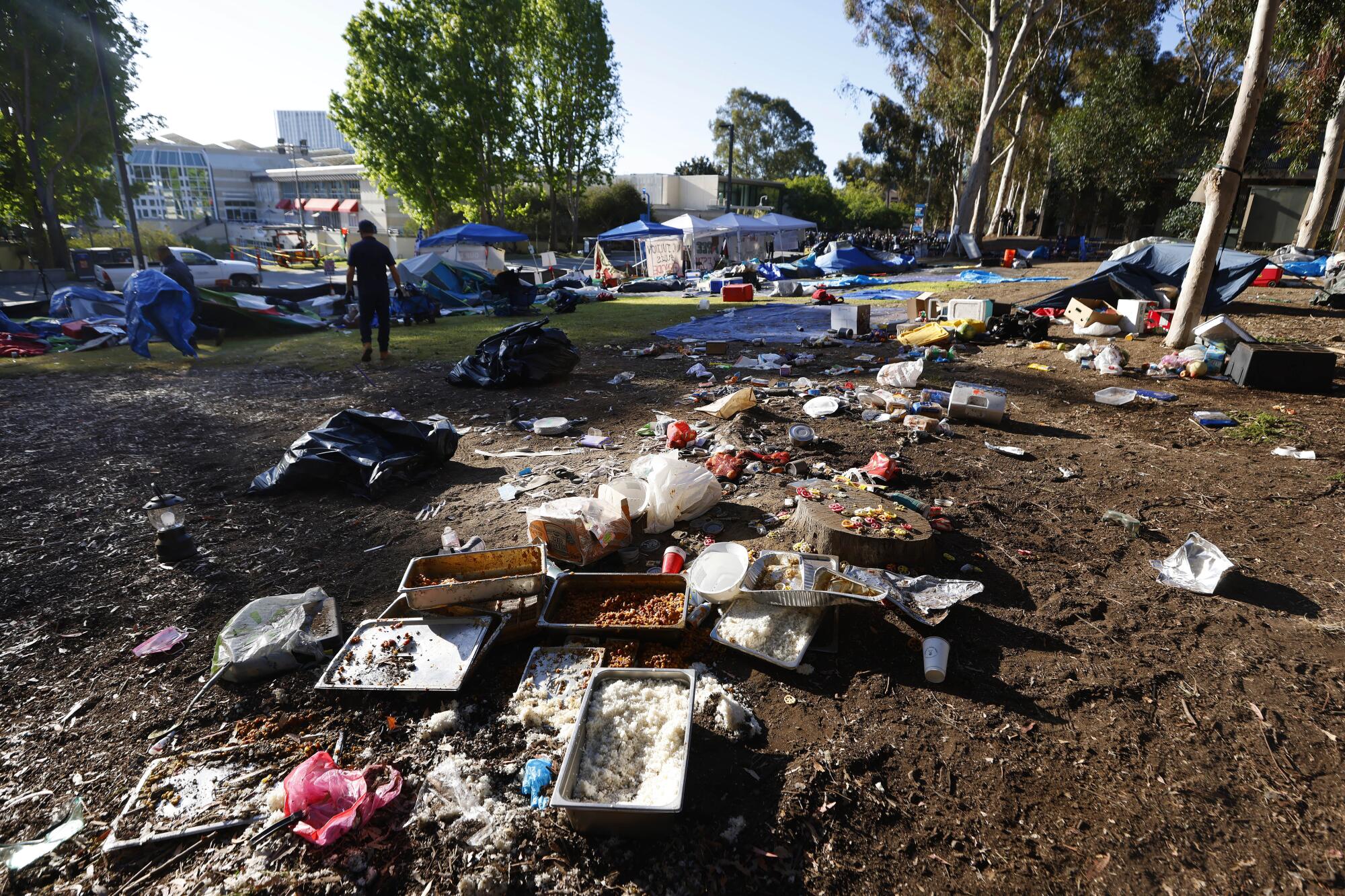
Get Essential San Diego, weekday mornings
Get top headlines from the Union-Tribune in your inbox weekday mornings, including top news, local, sports, business, entertainment and opinion.
You may occasionally receive promotional content from the San Diego Union-Tribune.


